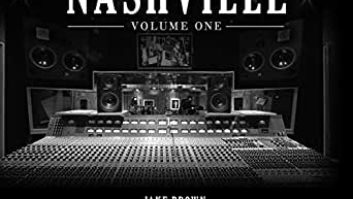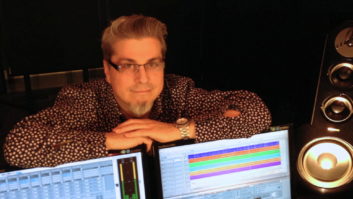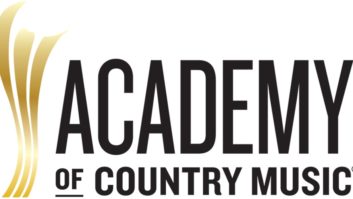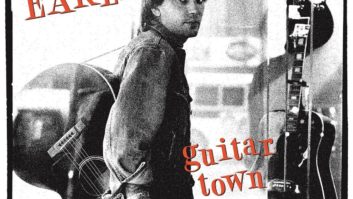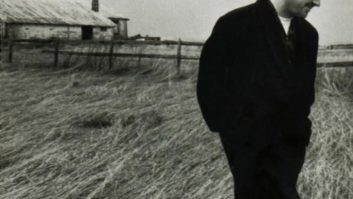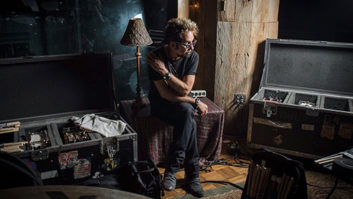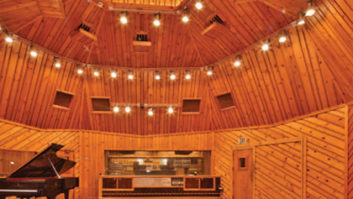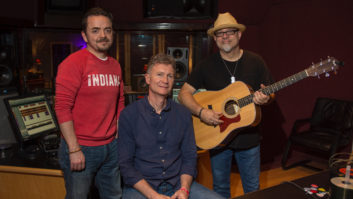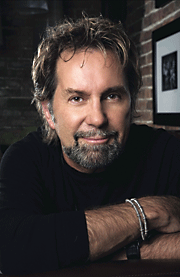
Video: Tony Brown’s Nashville
Podcast: Tony Brown……on the day he met George Massenburg
Podcast: Tony Brown…on the “Garth years,” when country went mainstream
Podcast: Tony Brown…on keeping musical traditions alive while staying relevant
Tony Brown is a featured guest at Mix Nashville, May 20 and 21. Click here
for more information.

The Platinum producer has strong opinions about country music’s place in his city and what makes Nashville great. Here are a few of Brown’s off-the-cuff observations after living, playing and producing in Nashville for more than 25 years.
MORE THAN COUNTRY
It seems like there is a mandate in Nashville to prove to the world that we’re more than country music. What does Los Angeles need to prove? That they’re more than pop music? It’s silly to spend time worrying about that.
But a lot of people do have a chip on their shoulder. I’ve heard this comment so much: “Everybody thinks we’re sitting on hay bales.” But that’s bullshit. I went over to England about six months ago to meet with Van Morrison, and he totally looks up to the country music legacy, even though country drew on some folk music from Ireland.
Kenny Chesney played Madison Square Garden several months ago, and I talked to somebody from Nashville who was there, who said, “I can’t believe the last song he played was ‘She Thinks My Tractor’s Sexy.’” They said, “That sent the wrong message.” But the crowd probably loved it. I said, “That’s great that he did that because it’s a big hit and it’s fun to play.” Hip-hop artists use bad grammar and urban street talk, and they’re not ashamed of it. Why should we be ashamed?
THE CENTER OF COUNTRY
The real reason we are a country music city is that this is where all the major labels have their country music divisions — Universal, Warner Bros., EMI, Sony BMG, Capitol — and they make big money for the major labels.
There is a country tradition here, and it doesn’t exist because of the Grand Ole Opry like some people think, but the Opry does help that tradition survive. The people who are in charge of the Opry, Steve Buchanan and Pete Fisher, took over the reins about 10 years ago, and they started including younger artists. Think of it: Carrie Underwood was just inducted into the Grand Ole Opry, and Mel Tillis just got inducted a month ago! There are a lot of young artists being inducted quicker because they’re trying to reach that young demographic. I think that’s smart because there will be people who prefer the old cats, the traditionalists, but their kids probably like to hear Carrie Underwood. They’re making sure the Opry doesn’t become a relic, even though it’s kind of corny and sweet to go and watch some of those old cats who otherwise wouldn’t have anywhere to play in front of 4,000 people. This way, the Opry still honors the legacy of the music, but it’s relevant to today’s country music industry.
When you think about it, the Opry is so important because it’s one of the last remaining live radio shows. And we all depend on radio to get the music out there, especially now that video channels don’t play music videos anymore.
SPEAKING OF RADIO
It used to be that when a country song got played on a CHR [Contemporary Hit Radio] station, it was considered a crossover, but around the time Garth Brooks came along, country music just became mainstream. We went from maybe a half-a-billion-dollar industry here in Nashville to a multibillion-dollar industry. But you have to remember that Soundscan changed things, too. With Soundscan measuring units sold, people like Garth Brooks and Vince Gill and Reba McEntire suddenly appeared on the pop and album charts. Before Soundscan, pop was being treated like a genre, but pop isn’t a genre; it’s an abbreviation for popular music.
But now the whole game is different because of satellite radio, which is so great. Suddenly, you’ve got classic country, young country, prime country, Americana, Roadhouse. Not every listener understands what the radio people mean with these names, but you can always find something worth listening to. I was at Sheryl Crow’s house for a party, and she had Willie’s Place on XM playing — all this really old stuff! But I bet you could go into any music executive’s office in town and they’re probably playing Feist or Kanye West because they want to be cool and “more than country.”
REAL LIVE RECORDING
One of the greatest things about recording in Nashville — its biggest draw, probably — is that it’s one of the last remaining places where live music happens. On the Reba McEntire Duets record, for example, we did a song with Justin Timberlake. He told us he wanted a dobro player, an acoustic player, a fiddle player and an upright bass. We were in the control room when Reba was doing her part, and Justin said, “God, I really miss working with live musicians. It’s so fun!”
A lot of pop music is done in pre-production: Some guy lays down a loop and it sounds cool. Here, the musicians do not even have sheet music; they have chord charts — the number system — that are great for the rhythm guitar player, but the people who play solos just create that spontaneously. I would say 90 percent of the music that happens here — and I’m talking about big hits like Keith Urban, Rascal Flatts, George Strait, Carrie Underwood — happens on the floor.
Tony Brown’s copious production credits include George Strait, Reba McEntire, Wynonna, Steve Earle and more.

LISTEN: Must Play
on keeping musical traditions alive while staying relevant
LISTEN: Must Play
on the “Garth years,” when country went mainstream
LISTEN: Must Play
on the day he met George Massenburg
